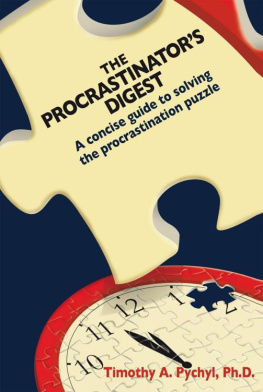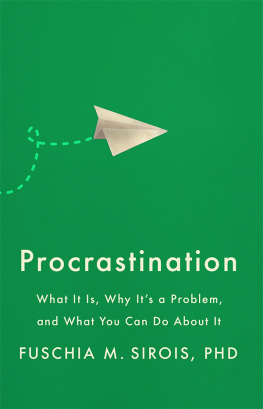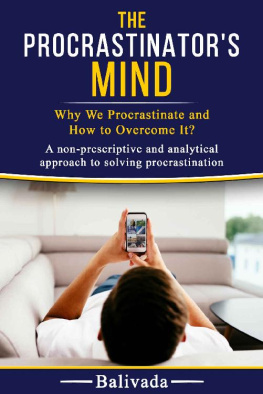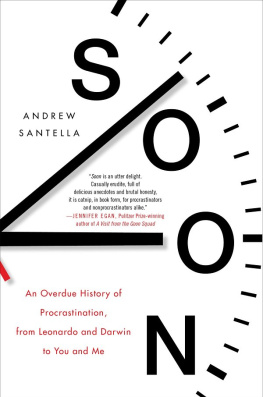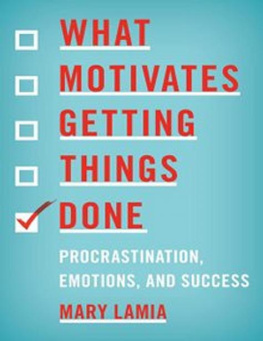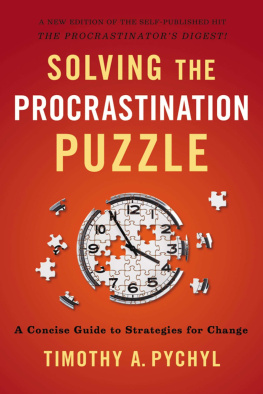Timothy A. Pychyl, Ph.D.
Copyright 2010 by Timothy A. Pychyl, Ph.D.
Cover art Copyright 2010 by Paul Mason.
Comics Copyright 2010 by Timothy A. Pychyl and Paul Mason.
All rights reserved. No part of this publication may be reproduced, stored in a retrieval system, or transmitted in any form or by any means, electronic, mechanical, photocopying, recording, scanning, or otherwise, without the prior written permission of the author.
Limit of Liability/Disclaimer of Warranty: While the author and the publisher have used their best efforts in preparing this book, they make no representations or warranties with respect to the accuracy or completeness of the contents of this book and specifically disclaim any implied warranties of merchantability or fitness for a particular purpose. The advice and strategies contained herein may not be suitable for your situation. You should consult with a professional where appropriate. Neither the author nor the publisher shall be liable for any loss of profit or any other commercial damages, including but not limited to special, incidental, consequential, or other damages.
This book was printed in the United States of America.
Sabbatical is a wonderful part of the academic life. It is a tradition where on every seventh year scholars are given time, uninterrupted by teaching and administrative duties, to read, research and write. I give thanks for this gift of scholarship, and I dedicate my writing to those at my university and faculty association who preserve this important tradition.
ACKNOWLEDGMENTS
T his book began to take shape from a collection of blog postings for Psychology Today . In fact, it was in writing my Dont Delay blog that I discovered how much I enjoyed writing to communicate ideas outside of formal, scholarly journal articles. I discovered that instead of writing to earn in my publish or perish academy, I was writing to learn and learning to write in a whole new way. Given this beginning to the book, I want to preface my acknowledgements by giving special thanks to Lybi Ma (Executive Editor, Psychology Today and author) who invited me to be part of the Psychology Today bloggers in 2008 and who has nurtured my sense of self as a writer. As well, I want to thank Hara Estroff Marano (Editor at Large, Psychology Today and author) who, like Lybi, has always been so encouraging and supportive. They are part of a truly wonderful team of people.
Writing is not a solitary activity even though we may struggle with concepts, ideas and the words to express these in our own dark night of the soul at times. Writing is a very social act from the inception of ideas through to revising a final manuscript. So, I have quite a few people I want to thank for helping me with my writing. Of course, as my father always told me, you can delegate the activity but not the responsibility; you can share the praise, but not the blame. This means that any of the shortcomings in my writing are my own. The things that you like best about this book are most probably due to the kind input of these others who deserve my words of appreciation.
As a scholar, I have drawn on a wide body of research in my writing. Yet, unlike my scholarly publications, I have not cited this work in an academic fashion, so I want to give credit to some key individuals who have developed the ideas that I have distilled in this digest. In terms of the procrastination research literature specifically, my colleagues Drs. Joseph Ferrari (DePaul University, Chicago), Clarry Lay (retired, York University, Toronto), Henri Schouwenburg (retired, University of Groningen, The Netherlands), Fuschia Sirois (Bishops University, Sherbrooke, Quebec) and Piers Steel (University of Calgary) have provided the foundation of ideas about how best to understand procrastination. If I was not drawing on their work directly in my writing, particularly that of Ferrari, Lay and Schouwenburg, I was speaking to some of my own research which was built on their work. I am grateful to have each of them as colleagues and friends.
In addition to the procrastination research, I drew on numerous other studies that have helped me to understand the nature of self-regulation failure, how we can structure our intentions to more successfully meet our goals, as well as aspects of our personality such as perfectionism that can undermine our goal pursuit. Although it is not possible to list everyone, I do want to note the enormous contributions made by, respectively, Drs. Roy Baumeister and Diane Tice (and their students at Florida State University), Brian Little (retired, Carleton University, Ottawa), Peter Gollwitzer (and his students at New York University) and Gordon Flett (York University, Toronto). I have learned a great deal from each of these scholars, and their work provided a framework for both understanding self-regulatory failure and strategies to more effectively exercise self-control to break unconscious habits and patterns of behavior.
It is easy to see how these esteemed and accomplished scholars have contributed to my own thinking and research. Not so obvious, but just as important, has been the contribution of my own students to my research and writing. My research is driven by my students, as research at the graduate level in particular is a means to teaching and learning. I want to thank all of my students who have participated in procrastination research with me since 1995 as part of the Procrastination Research Group , and I particularly want to identify the important contributions made by Shannon Bennett, Kelly Binder, Allan Blunt, Matthew Dann, Mohsen Haghbin, Eric Heward, Jennifer Lavoie, Adam McCaffrey, Rick Morin, Brian Salmon, Matthew Shanahan, Kyle Simpson, and Rachelle Thibodeau. Each of these students has taken his or her own research past the thesis requirements and into the scholarly literature more formally.
Moving from research results to communicable ideas for others to read is a craft unto itself. I am grateful for the help of my wife Beth who, as a non-psychologist, is willing to ask me to clarify my ideas or my words. It takes courage for her to persist at times, I fear, because it is easy for me to become defensive about my writing. I know her thoughtful comments always make my thinking and writing clearer. In addition, my friend, Jeannie Bacon, who was willing to test the strength of friendship by providing her expertise to the editing of my book, has made an important difference in my writing. Jeannie, a writer with both graduate work in English and professional experience in technical writing, helped me to be more coherent and consistent with my prose. Places where you still might find problems with my writing are places where I failed to heed her helpful advice.
The comics in the book, which provide a different perspective on the concepts discussed as well as a little laughter at our all too human tendency to put it off until tomorrow, are due to the talents of my friend Paul Mason. I met Paul when he was a boy and I was living one of my other lives as a canoe outfitter for Trailhead in Ottawa. Along with his father Bill and his sister Becky, Paul has developed an international reputation for canoeing and art. I was delighted when he agreed to collaborate with me on a comic series and to bring his artistic talents to the design of the cover. When a particular comic makes you laugh, you can be sure it was Pauls creative insight that captured the concept so well.

